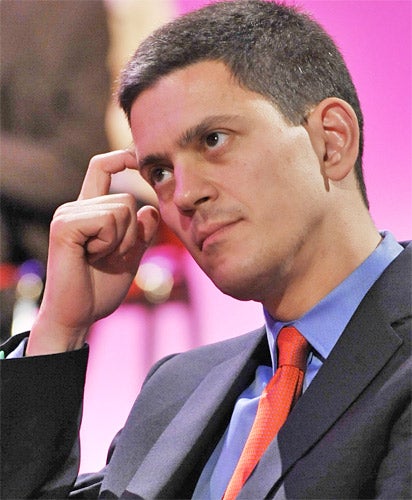The awkward dilemma facing a vanquished contender

Your support helps us to tell the story
From reproductive rights to climate change to Big Tech, The Independent is on the ground when the story is developing. Whether it's investigating the financials of Elon Musk's pro-Trump PAC or producing our latest documentary, 'The A Word', which shines a light on the American women fighting for reproductive rights, we know how important it is to parse out the facts from the messaging.
At such a critical moment in US history, we need reporters on the ground. Your donation allows us to keep sending journalists to speak to both sides of the story.
The Independent is trusted by Americans across the entire political spectrum. And unlike many other quality news outlets, we choose not to lock Americans out of our reporting and analysis with paywalls. We believe quality journalism should be available to everyone, paid for by those who can afford it.
Your support makes all the difference.After spending four agonising days pondering whether or not to take up a place in his younger brother's Shadow Cabinet, an unguarded comment during the new Labour leader's speech yesterday has added a last-minute twist to David Miliband's imminent decision over his political future.
The former foreign secretary has until 5pm today to declare his intention to join Labour's front bench. But his pointed criticism of Harriet Harman, for applauding Ed Miliband's denunciation of the Iraq invasion, laid bare the tensions that would plague Labour with both of the brothers in prominent positions. Even before the comments were reported, his future remained the talk of the conference ahead of his brother's first speech as leader. While most senior figures in the Labour party were keen to see him take a position in the shadow team, they also conceded that this would be difficult in practice.
His wife, Louise Shackelton, was seen in tears on Monday, and is said to be furious at Ed Miliband's decision to run for leader. Alistair Darling, the former Chancellor, summed up the feeling in Manchester yesterday as he reflected on David Miliband's decision over taking a prominent Shadow Cabinet portfolio, saying he was "damned if he does, damned if he doesn't". "If he stays in, people will look at every interview he does, every article and say 'Does he agree with his brother or doesn't he?' If he doesn't go into the Shadow Cabinet, people will say 'Oh he walked away'."
So, as he returned to his home in primrose Hill, London, last night, the question remains: what are David Miliband's options?
Take a Shadow Cabinet job
Keeping the role of shadow Foreign Secretary seemed a likely option at one stage, allowing him to stay out of damaging policy disputes, and giving him an independent sphere of influence. However, his comments on Iraq have now made that all but impossible.
Other positions were already more unlikely. Many on the right of the party were keen to see him installed as Mr Darling's replacement, partly as he would support his plan to halve the deficit in four years. But that would have immediately put him at odds with his younger brother, who has voiced a preference to bring public finances under control at a slower rate. The only other frontbench job big enough would be shadow Home Secretary. David Miliband's refusal to attack the record of New Labour may make him a bad choice for the role, after his brother criticised the party's recent record on civil liberties.
Return to the backbenches
If he refuses to run for the Shadow Cabinet, he will have to resign himself to serving for a period as a backbencher. While some Labour MPs use the position to keep the leadership honest, his every word will be pored over for any coded message about his brother, putting him under intense pressure to remain silent. It is difficult to see how a man who has spent his entire political career in influential positions would be satisfied with dealing with bin collections in South Shields.
Run to be head of the International Monetary Fund
The job may become vacant should the current incumbent, Dominique Strauss-Kahn, decide to run in the 2012 French presidential elections. It would certainly be intellectually stimulating. But he may struggle to meet the qualifications for such a high-profile economic position, while developing countries are pressuring to hand the role to a non-European. It could also put him in competition with another vanquished Labour politician tipped for the job – Gordon Brown.
Become EU foreign minister
He was courted for the second most powerful position in the EU last year and seriously considered accepting. It was ultimately filled by Baroness Ashton, who is widely believed to be struggling in the job and may quit. Power for appointing the post lies with the socialist grouping. But the machinations of parachuting Miliband into the job are complicated, and he may have blown his chances after snubbing it less than a year ago.
Disappear from public life
If he believes that his time as a backbencher would be beset with too many pitfalls, a complete withdrawal from public life would be the extreme option. Many in Westminster have often commented that the older Miliband would be more at home in a dusty Harvard library than the corridors of power, such is his reputation as a cerebral, if nerdy, politician. It could be the most suitable and rewarding exit strategy of all.
Join our commenting forum
Join thought-provoking conversations, follow other Independent readers and see their replies
Comments